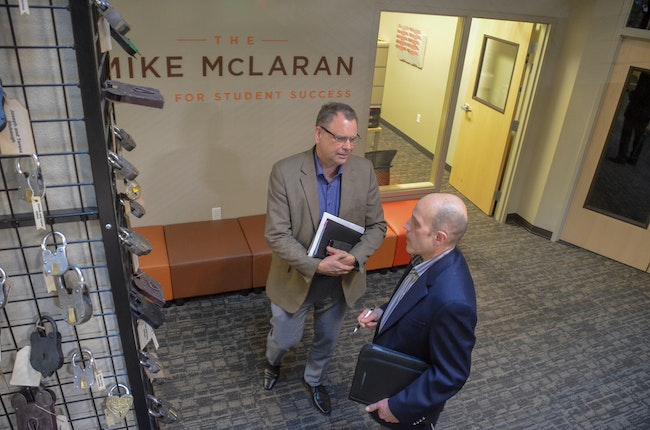 Kelly Carlisle, left, executive director of the Salem-Keizer Education Foundation, and Jeff Aeschliman, board president, talk at the foundation’s office in downtown Salem (Rachel Alexander/Salem Reporter)
Kelly Carlisle, left, executive director of the Salem-Keizer Education Foundation, and Jeff Aeschliman, board president, talk at the foundation’s office in downtown Salem (Rachel Alexander/Salem Reporter)
Salem-Keizer Education Foundation leaders are cutting after school programs serving 800 local middle school students and may sell their downtown building to further cut costs.
Executive director Kelly Carlisle and board president Jeff Aeschliman announced the changes this week after notifying staff and Salem-Keizer School District leaders earlier this fall. It’s part of an ongoing effort to get the organization back on stable ground financially.
The foundation is a nonprofit organization working to support the Salem-Keizer school district through mentoring programs, youth sports and other activities for students.
The cuts mean Crossler, Judson, Walker, Straub, Leslie and Whiteaker middle schools will no longer have an Enrichment Academy after winter break. The academy is a before and after school program where students do art, science, sports and other activities.
Those schools were chosen because their programs aren’t self-supporting, Carlisle said. Other enrichment academies at local elementary and high schools, as well as Claggett Creek, Houck, Parrish and Stephens middle schools, are paid for with grants or tuition, and will stay open, Carlisle said.
The cut means laying off one employee from the foundation’s office, and 22 part-time staff who ran the program, as well as 42 volunteers. Carlisle said the foundation would save about $50,000 this year from the cuts.
Aeschliman said the cut was part of a “top to bottom evaluation of all of SKEF’s programs.”
“We’re trying to make sure that what we do going forward is sustainable,” Carlisle said.
[ Help build Salem Reporter and local news – SUBSCRIBE ]
Salem-Keizer Superintendent Christy Perry said the cut was “really disappointing and creates a void for our kids, but also a decision the SKEF board had to make” for long-term viability.
Establishing more programs for time before and after school hours has been a major theme she’s heard from parents and school staff in the past month as a way to spend extra state money next year.
“I just hope they’ll really stay true to getting finances in order, which I believe they are,” she said. She praised Carlisle and the board’s work to keep the foundation afloat.
Carlisle, a former Salem-Keizer administrator, came to the foundation in August after a tumultuous year where the organization saw cash flow problems after a period of rapid growth. The organization also had significant debt tied to buying and remodeling its downtown building, a former mercantile on the National Register of Historic Places.
A Salem Reporter investigation earlier this year found unexpected construction delays and gifts that didn’t materialize contributed to a higher-than-expected mortgage on the remodeled building. When the foundation moved in January 2018, it was already behind paying back a temporary construction loan and was still waiting on an expected $250,000 grant from the state.
 Books fill the downtown office of the Salem-Keizer Education Foundation on Dec. 17, 2019 (Rachel Alexander/Salem Reporter)
Books fill the downtown office of the Salem-Keizer Education Foundation on Dec. 17, 2019 (Rachel Alexander/Salem Reporter)
Former executive director Krina Lee left the foundation that summer as cash flow problems came to light. Board leaders worked for months to establish payment plans with creditors and explore potential cuts to save the foundation before hiring Carlisle. He said then that he intended to focus on rethinking the organization’s mission and cutting programs that weren’t essential to that purpose.
Part of that plan included leasing out the second floor of the downtown office to offset mortgage costs.
Aeschliman said that effort produced one tenant, Bridgeway Recovery Services. As cash flow problems continued, the board considered selling the building after discussions with some major donors, who were supportive.
They have not yet publicly listed the building.
Carlisle said if the building sells, the foundation would stay in place with a short-term lease for a year or more and then consider relocating outside of downtown.
Perry said losing the remodeled building would be “a bummer” but said that the services the foundation provides to students are more important.
“Keeping the building is not worth the cost of folding the organization,” she said.
If the building doesn’t sell, the foundation will look for more renters, Aeschliman said.
Foundation staff and the board have worked to track staff hours spent on various projects to get a better idea of how much various efforts cost and are continuing to evaluate programs, Carlisle said. They’ll continue to put on the Awesome 3000, a spring fun run and fundraiser, and the Crystal Apple Awards, which honor local educators.
He expects a full review to be finished in two or three months.
Reporter Rachel Alexander: [email protected] or 503-575-1241.

Rachel Alexander is Salem Reporter’s managing editor. She joined Salem Reporter when it was founded in 2018 and covers city news, education, nonprofits and a little bit of everything else. She’s been a journalist in Oregon and Washington for a decade. Outside of work, she’s a skater and board member with Salem’s Cherry City Roller Derby and can often be found with her nose buried in a book.









